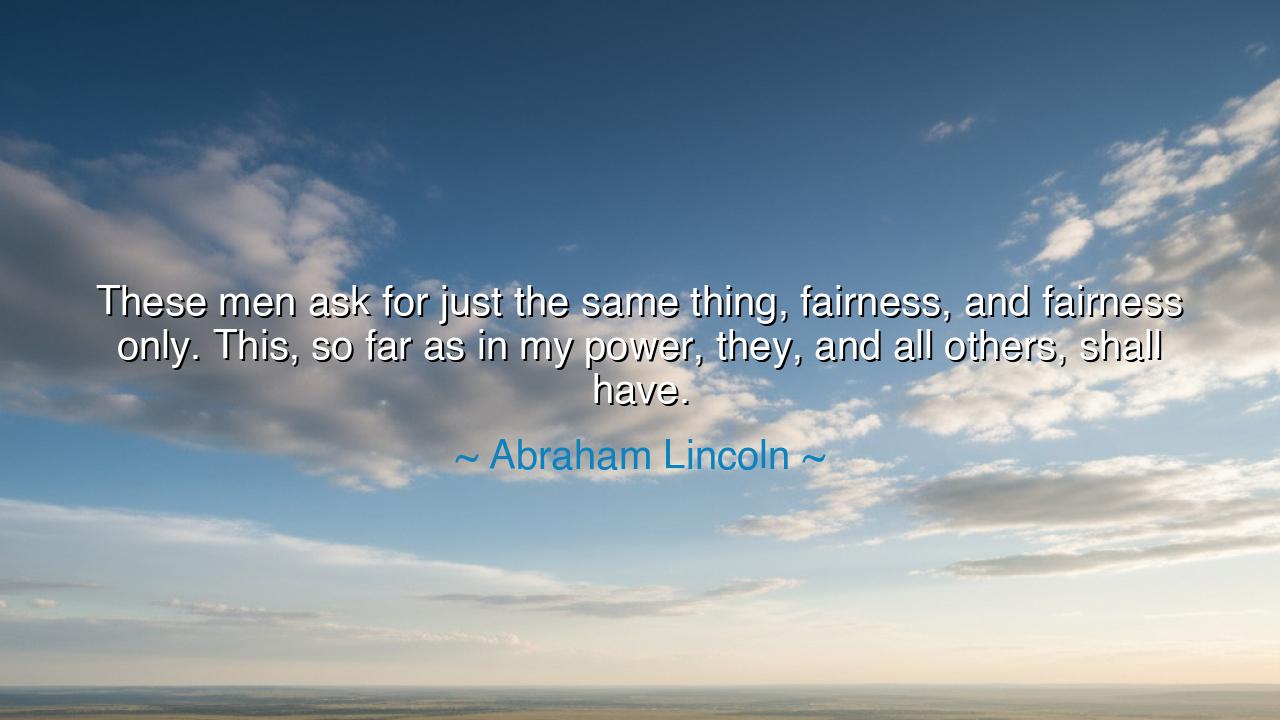
These men ask for just the same thing, fairness, and fairness
These men ask for just the same thing, fairness, and fairness only. This, so far as in my power, they, and all others, shall have.






When Abraham Lincoln declared, “These men ask for just the same thing, fairness, and fairness only. This, so far as in my power, they, and all others, shall have,” he was not merely speaking as a leader of a nation divided by war — he was speaking as the voice of conscience for all humanity. In those words lived the ancient cry for justice, a virtue revered by philosophers and prophets since the dawn of civilization. Lincoln, standing in the heart of a storm that tore America apart, affirmed that every human soul, regardless of color or station, is entitled to the same measure of fairness — not privilege, not pity, but equal justice under heaven’s law.
The origin of this quote lies in Lincoln’s lifelong struggle to reconcile power with righteousness. During the dark years of the Civil War, when the question of slavery tested the soul of the republic, Lincoln bore the burden of both warrior and healer. These words, drawn from his reflections and letters, reveal a man who understood that leadership is not about domination, but about equity — the sacred duty to give each man his due. He spoke not to flatter the strong, but to defend the weak, for he knew that the measure of a nation’s greatness is found not in its wealth or armies, but in its fairness toward its most vulnerable.
In this ideal, Lincoln stood beside the ancients. Solon of Athens once said that laws must be written not for the rich or the poor, but for all, lest the city devour itself. Confucius taught that a ruler who governs with fairness becomes like the North Star — steadfast, and all others turn toward him. And in the same spirit, Lincoln, the humble rail-splitter turned president, wielded his moral compass not as a weapon of vengeance, but as an instrument of balance. His words remind us that justice is not born of passion or prejudice, but of calm, deliberate fairness — a fairness that holds friend and foe alike beneath the same sun.
Consider the story of Robert Gould Shaw, commander of the 54th Massachusetts Regiment — one of the first African American units in the Union Army. When his men demanded equal pay for equal service, Shaw stood beside them in defiance of the injustice. He refused his own salary until his soldiers received theirs. That act embodied the very essence of Lincoln’s vision: that fairness is not granted by power, but proven by sacrifice. It is the bridge between the words of principle and the deeds of courage.
Fairness, as Lincoln understood it, is the seed of peace. Where injustice reigns, hatred festers; where fairness thrives, trust grows. To practice fairness is to recognize the divine image in every soul — to act not out of preference, but out of truth. It is not blind, but seeing clearly; not cold, but filled with compassion. It demands that we hold ourselves to the same standard we demand of others. In this, fairness becomes not merely a political virtue, but a moral calling.
Yet fairness is not an easy path. It requires restraint when anger burns, patience when fear cries out for retribution, and humility when power tempts the heart to arrogance. Lincoln himself faced scorn from those who thought him too soft, too hesitant, too kind. But he knew that to wield justice without fairness is to become the very tyrant one claims to resist. His greatness lay not in his might, but in his mercy — in his ability to see beyond the divisions of his age toward the eternal principle of equity.
The lesson, then, for all generations is this: fairness must begin within the heart before it can govern the world. If you would be just, you must first strip yourself of bias. If you would lead, you must first learn to listen. Let your words be measured, your judgments honest, your compassion steady. Do not seek to win every argument, but to honor the truth in every man. For as Lincoln’s life proved, fairness is not weakness — it is the quiet strength that sustains freedom when all else falls.
And so, may his words echo through the ages: to give each person fairness and fairness only, as far as lies within our power, is to align oneself with the eternal law that binds heaven and earth. To live by this principle is to walk with the giants of history — to become, like Lincoln, a keeper of the world’s fragile balance between justice and mercy.






AAdministratorAdministrator
Welcome, honored guests. Please leave a comment, we will respond soon